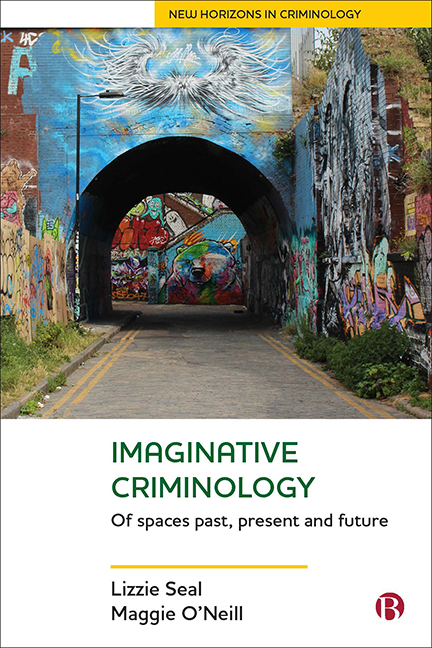Book contents
- Frontmatter
- Contents
- List of figures and tables
- Preface
- 1 Imaginative Criminologies of Space: the Spaces of Imaginative Criminology
- 2 Historical Spaces of Confinement 1: Homes for Indigenous Children in Australia
- 3 Historical Spaces of Confinement 2: Magdalene Laundries
- 4 Creative Writing and the Imagined Spaces of Imprisonment
- 5 Border Spaces and Places: the Age of the Camps
- 6 Imagining Spaces of Violence and Transgression in Vancouver and Northern Ireland
- 7 Imagining Dystopian Futures in Young Adult Fiction
- 8 Conclusion
- References
- Index
7 - Imagining Dystopian Futures in Young Adult Fiction
Published online by Cambridge University Press: 30 April 2022
- Frontmatter
- Contents
- List of figures and tables
- Preface
- 1 Imaginative Criminologies of Space: the Spaces of Imaginative Criminology
- 2 Historical Spaces of Confinement 1: Homes for Indigenous Children in Australia
- 3 Historical Spaces of Confinement 2: Magdalene Laundries
- 4 Creative Writing and the Imagined Spaces of Imprisonment
- 5 Border Spaces and Places: the Age of the Camps
- 6 Imagining Spaces of Violence and Transgression in Vancouver and Northern Ireland
- 7 Imagining Dystopian Futures in Young Adult Fiction
- 8 Conclusion
- References
- Index
Summary
Works of fiction offer great potential for doing imaginative criminology as they ‘offer complex and layered social realities that can be explored criminologically and sociologically’ (Frauley, 2010: 13). Fiction is vitally important to generating images and fantasies about social life and offers the possibility to create and participate in other worlds and new ways of life. This chapter explores imagined dystopias in young adult fiction as a means to think through problems of ordering, social control and repression. The novels depict undesirable worlds but in doing so offer hope for resistance and survival. The analysis of fictional worlds can demonstrate the applicability of criminological concepts and highlight issues relevant to the social world (Ruggiero, 2003; Piamonte, 2015). As such, fictional realities provide criminologists with an important pedagogical tool (Frauley, 2010). They also offer the space to think through transgression, plurality and power in a way that is more open and alive to multiplicity than criminology usually permits.
While fictional realities in films and television programmes have received attention, few criminologists have explored literature. Piamonte (2015) argues that novels enable creative criminological sense making about important social themes, such as her examination of the portrayal of violence and racism in Wright's (1940) Native Son. Ruggiero (2015) explores the depiction of crimes of the powerful in the novels of Balzac, the sociological analyses of imprisonment that can be derived from Victor Hugo and Octave Mirbeau (Ruggiero, 2012) and the different aspects of war portrayed by Stendhal and Tolstoy (Ruggiero, 2018). Page and Goodman (2018) analyse how Edward Bunker's novels on prison life further understanding of the subjective experience of incarceration.
Previous criminological analyses of novels demonstrate their significance for imaginative criminology but have largely been restricted to ‘canonical’ literature, rather than fiction that intersects with popular culture. They are also concerned predominantly with literary realism. This chapter departs from this focus to consider how mass market dystopian fiction for young adults facilitates the imagining of undesirable futures and reflection on social injustices in the present. Young adult (YA) fiction typically adopts a pedagogical role in terms of expanding readers’ understanding of themselves and the world (Bull, 2012). While this can be didactic, it is subversive in placing young people at the centre of narratives in which adults are peripheral, absent and/or in opposition to the protagonists (Hintz and Ostry, 2003).
- Type
- Chapter
- Information
- Imaginative CriminologyOf Spaces Past, Present and Future, pp. 117 - 132Publisher: Bristol University PressPrint publication year: 2019

